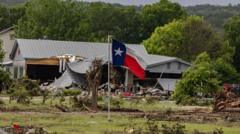As drought grips Chihuahua, Mexico, a water-sharing feud with Texas escalates over the terms of a decades-old treaty. Local farmers grapple with inadequate water supplies while their US counterparts express frustration over perceived breaches of the agreement.
Water Crisis Deepens Tensions Between US and Mexico Amid Ongoing Drought

Water Crisis Deepens Tensions Between US and Mexico Amid Ongoing Drought
With water levels at Lake Toronto alarmingly low, ongoing disputes over a water-sharing treaty between the US and Mexico create friction amidst persistent drought conditions.
The ongoing water crisis in Chihuahua, Mexico, has intensified tensions between the US and its southern neighbor as both sides grapple with the terms of a crucial water-sharing treaty amidst devastating drought conditions. Locals from San Francisco de Conchos are turning to prayer, seeking divine intervention as they face the harsh realities of 30 consecutive months without rain.
On the shores of Lake Toronto, once a vital reservoir located behind the La Boquilla dam, residents are witnessing the alarming decline of water levels. Rafael Betance, a local monitor, has observed that the reservoir has not been full since 2017 and is now at just 14% of its capacity, a staggering 26.52 meters below its high-water mark. The community’s plight is compounded with unrelenting heat, soaring to 42°C (107.6°F), leaving little hope for relief.
A 1944 water-sharing agreement obligates Mexico to send 430 million cubic meters of water from the Rio Grande to the US each year. In exchange, the US provides a more substantial water supply from the Colorado River to Mexican cities, including Tijuana and Mexicali. However, Mexico has consistently struggled to fulfill its obligations under the treaty, especially in this era of unprecedented drought, leading to accusations of a "water theft” from Texas officials.
While the Trump administration previously threatened tariffs and sanctions if Mexico did not comply, President Claudia Sheinbaum has acknowledged the country’s shortfalls while taking a more diplomatic approach. So far, Mexico has only sent a fraction of the required water to the US, sparking frustration and concern over farming viability in both countries.
Tensions have erupted in the past; a tragic incident in 2020 left two Mexican citizens dead during clashes with the National Guard over water distribution rights. Meanwhile, Texas farmers like Brian Jones are struggling with their irrigation needs, stating that they have only been able to use a fraction of their farmland due to insufficient water access, attributing the situation to Mexico’s non-compliance with the treaty.
The differing interpretations of their water-sharing responsibilities have exacerbated hostilities, with farmers in Chihuahua maintaining that their obligations come second to local demands during such severe drought. As many Mexican farmers resort to outdated irrigation methods that consume significant amounts of water, some like Jaime Ramirez are turning to modern practices to optimize water usage.
Nonetheless, the dire state of the region's water resources casts a shadow over both sides. Betance warns the ecological implications of Lake Toronto's dwindling waters extend beyond farming, threatening local marine life and the tourism industry. As both nations face the long-term consequences of climate change and increasing population pressures, opinions diverge regarding the future of the 1944 water-sharing agreement.
With little indication of much-needed rain on the horizon, both communities rely on hope and adaptability to navigate the brink of disaster.


















